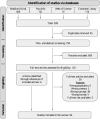Identifying patients with psychosocial problems in general practice: A scoping review
- PMID: 36844957
- PMCID: PMC9945547
- DOI: 10.3389/fmed.2022.1010001
Identifying patients with psychosocial problems in general practice: A scoping review
Abstract
Objective: We conducted a scoping review with the aim of comprehensively investigating what tools or methods have been examined in general practice research that capture a wide range of psychosocial problems (PSPs) and serve to identify patients and highlight their characteristics.
Methods: We followed the Preferred Reporting Items for Systematic Reviews and Meta-Analyses extension for scoping reviews and the Joanna Briggs Institute Reviewer's Manual on scoping reviews. A systematic search was conducted in four electronic databases (Medline [Ovid], Web of Science Core Collection, PsycInfo, Cochrane Library) for quantitative and qualitative studies in English, Spanish, French, and German with no time limit. The protocol was registered with Open Science Framework and published in BMJ Open.
Results: Of the 839 articles identified, 66 met the criteria for study eligibility, from which 61 instruments were identified. The publications were from 18 different countries, with most studies employing an observational design and including mostly adult patients. Among all instruments, 22 were reported as validated, which we present in this paper. Overall, quality criteria were reported differently, with studies generally providing little detail. Most of the instruments were used as paper and pencil questionnaires. We found considerable heterogeneity in the theoretical conceptualisation, definition, and measurement of PSPs, ranging from psychiatric case findings to specific social problems.
Discussion and conclusion: This review presents a number of tools and methods that have been studied and used in general practice research. Adapted and tailored to local circumstances, practice populations, and needs, they could be useful for identifying patients with PSPs in daily GP practice; however, this requires further research. Given the heterogeneity of studies and instruments, future research efforts should include both a more structured evaluation of instruments and the incorporation of consensus methods to move forward from instrument research to actual use in daily practice.
Keywords: general practice; identification tools; primary care; psychosocial problems; scoping review; social problems.
Copyright © 2023 Schwenker, Deutsch, Unverzagt and Frese.
Conflict of interest statement
The authors declare that the research was conducted in the absence of any commercial or financial relationships that could be construed as a potential conflict of interest.
Similar articles
-
Identifying patients with psychosocial problems in general practice: a scoping review protocol.BMJ Open. 2021 Dec 20;11(12):e051383. doi: 10.1136/bmjopen-2021-051383. BMJ Open. 2021. PMID: 34930731 Free PMC article.
-
Beyond the black stump: rapid reviews of health research issues affecting regional, rural and remote Australia.Med J Aust. 2020 Dec;213 Suppl 11:S3-S32.e1. doi: 10.5694/mja2.50881. Med J Aust. 2020. PMID: 33314144
-
Instruments in general practice to identify and to measure (over)burden due to informal care for caring relatives: a scoping review protocol.BMJ Open. 2023 Jun 28;13(6):e067934. doi: 10.1136/bmjopen-2022-067934. BMJ Open. 2023. PMID: 37380204 Free PMC article.
-
Deprescribing medicines in older people living with multimorbidity and polypharmacy: the TAILOR evidence synthesis.Health Technol Assess. 2022 Jul;26(32):1-148. doi: 10.3310/AAFO2475. Health Technol Assess. 2022. PMID: 35894932 Free PMC article. Review.
-
Access to general practice for people with intellectual disability in Australia: a systematic scoping review.BMC Prim Care. 2022 Nov 29;23(1):306. doi: 10.1186/s12875-022-01917-2. BMC Prim Care. 2022. PMID: 36447186 Free PMC article.
References
-
- DEGAM. DEGAM-Zukunftspositionen. (2013). Available online at: https://www.degam.de/files/Inhalte/Degam-Inhalte/Ueber_uns/Positionspapi... (accessed July 6, 2021).
-
- Zimmermann T, Mews C, Kloppe T, Tetzlaff B, Hadwiger M, von dem Knesebeck O, et al. Soziale Probleme in der hausärztlichen Versorgung – Häufigkeit, Reaktionen, Handlungsoptionen und erwünschter Unterstützungsbedarf aus der Sicht von Hausärztinnen und Hausärzten. [Social problems in primary health care: prevalence, responses, course of action, and the need for support from a general practitioners’ point of view]. Z Evid Fortbild Qual Gesundhwes. (2018) 131–32:81–9. 10.1016/j.zefq.2018.01.008 - DOI - PubMed
-
- World Health Organization [WHO]. Social determinants of health. (2019). Available online at: https://www.who.int/health-topics/social-determinants-of-health (accessed March 4, 2022).
Publication types
LinkOut - more resources
Full Text Sources
Miscellaneous


